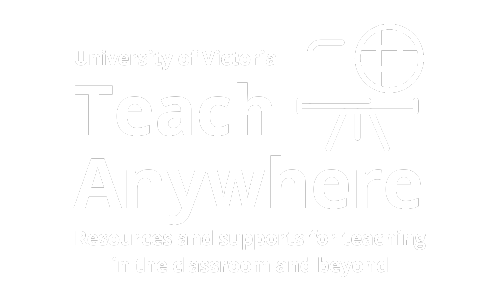Accessibility Statement: LTSI aims to make this workshop as accessible as possible. Harry Hickman Building room 128 is mobility aid accessible. There is a single stall accessible washroom on the main floor adjacent to room 128. Room 128 is a small sized classroom with circular tables and moveable chairs. The room utilizes fluorescent lights. To be respectful of those with allergies and environmental sensitivities, please refrain from wearing strong fragrances. For any further inquiries regarding access please email ltsisupport@uvic.ca.
Access Points: The 5 Spheres of Accessibility in Teaching and Learning
Register here
Thursday, January 23, 2025 | 11:30 am – 12:50 pm
Expanding accessibility in teaching requires a comprehensive approach that reflects the complex dynamics of the learning process. This workshop creates a space to explore five spheres of accessibility in teaching and learning: Communication, Time, Space, Engagement and Materials. Facilitators will share accessibility strategies related to each of the spheres. Participants will engage in peer-to-peer dialogue around how accessibility expansion increases equity and reduces barriers for a range of diverse students. Participants will work together to analyse case studies applying the 5 spheres.
In this workshop, participants will:
- Define accessibility and accessible pedagogy
- Explore five interconnected spheres of accessibility in teaching and learning
- Identify two accessibility strategies to integrate in a future (or current) course
Planning for Accessibility in Timed Assessments
Register here
Thursday, February 20, 2025 | 11:30 am – 12:50 pm
Face-to-face timed assessments (e.g., traditional exams) can present educational barriers for students. Integrating accessibility strategies can reduce these barriers and provide a more accurate demonstration of each students’ knowledge, skills and competencies. Facilitators will share accessibility considerations and discuss accessibility strategies that can be used for face-to-face timed assessments. As part of this conversation, facilitators and participants will discuss Universal Extended Time (UET). Through a dialogue, participants will consider what strategies are applicable in their own contexts.
In this workshop, participants will:
-
Explore how accessible strategies can be applied to face-to-face timed assessments to reduce educational barriers for students
-
Understand the definition and considerations of Universal Extended Time (UET)
-
Evaluate the challenges and opportunities in integrating accessibility strategies into face-to-face timed assessments
Breaking Barriers: Accessible Strategies in Teaching
Register here
Thursday, March 20, 2025 | 1 pm – 2:20 pm
In this workshop participants will explore ways to break down common educational barriers for students by applying access-centred strategies that address these barriers. This interactive workshop will provide an overview of some of the most frequent access barriers students at UVic experience and provide suggestions and strategies to pro-actively mitigate these barriers through course design. Facilitators will engage with case study examples that allow participants to explore how to apply these strategies. This workshop will support participants to identify and reflect on ways they can enhance inclusivity and accessibility in their teaching environments.
In this workshop, participants will:
-
Define accessibility and accessible pedagogy
- Explore how accessibility strategies can address common access barriers to equitable education experiences
- Discuss the applicability of accessibility strategies and ways to adapt them to specific disciplines and courses
